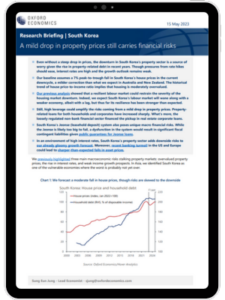A mild drop in property prices still carries financial risks in South Korea

Even without a steep drop in prices, the downturn in South Korea’s property sector is a source of worry given the rise in property-related debt in recent years. Though pressures from rate hikes should ease, interest rates are high and the growth outlook remains weak.
Our baseline assumes a 7% peak-to-trough fall in South Korea’s house prices in the current downcycle, a milder correction than what we expect in Australia and New Zealand. The historical trend of house price-to-income ratio implies that housing is moderately overvalued.
What you will learn:
- Our previous analysis showed that a resilient labour market could restrain the severity of the housing market downturn.
- Still, high leverage could amplify the risks coming from a mild drop in property prices. Property-related loans for both households and corporates have increased sharply.
- South Korea’s Jeonse (leasehold deposit) system also poses unique macro financial risks.
- In an environment of high interest rates, South Korea’s property sector adds downside risks to our already gloomy growth forecast. Moreover, recent banking turmoil in the US and Europe could lead to sharper-than-expected falls in asset prices.
Tags:
Related posts

Post
The macro impact of the AI boom in Taiwan and South Korea
The launch of ChatGPT in November 2022 made 2023 a leap forward for artificial intelligence (AI). The big battle for the future AI winners heated up and many tech companies revealed their future investment plans during the latest earnings season. A global race to build the most powerful AI chips has begun, which will potentially revolutionise the global tech sector.
Find Out More
Post
How politics could affect APAC economics in a busy 2024 – a primer
Our view is that the flurry of elections across Asia this year generally do not look like high-risk events for investors.
Find Out More
Post
Three key idiosyncrasies in Asian trade and why they matter
Idiosyncrasies in recent Asian trade data suggest that country-specific factors are becoming more influential and causing some countries' exports to buck cyclical trends. If that continues, the fortunes of regional exporters will diverge further in 2024, though we still think the overall export trend will be subdued.
Find Out More